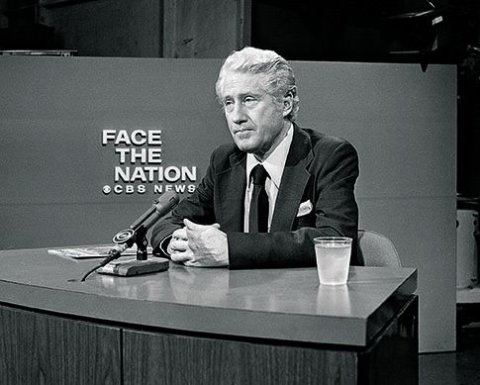The standard Watergate narrative goes like this: Two young Washington Post reporters take down the president of the United States with the help of a wacko government source code-named Deep Throat who likes to meet secretly in underground parking garages.
Wrong, says former journalist Peter Landesman, the writer and director of Mark Felt: The Man Who Brought Down the White House, a powerful new film about the secret FBI source who led Bob Woodward and Carl Bernstein to the larger story of President Richard M. Nixon's dirty tricks behind the Watergate break-in.
"It's one of the greatest films of all time," grants Landesman, speaking of All the President's Men, the 1976 film based on the Woodward and Bernstein book of the same name. "And it's an important book. It's just not the whole truth." Landesman's film, the third he has written and directed (including 2015's Concussion), aims to set the record straight, and it provides Liam Neeson with his best role to date. Neeson plays FBI lifer Felt, the bureau's then–second in command, the guy who almost single-handedly forced Nixon to resign on August 9, 1974. "And nothing was ever the same in American politics," says Landesman. Newsweek talked with him about that and much more.
I agree with you that the mythology of Woodward and Bernstein and The Washington Post taking down Nixon needs a correction. A Democratic-controlled Congress and the role of Felt and the FBI deserve equal if not more billing.
That's taking nothing away from Carl or Bob. I think Bob, especially, appreciates the fact that it wasn't only about them. They know that. They'd be the first to say it. But, you know, look, the power of Hollywood, especially the star power of the biggest movie star in the world at the time [Robert Redford, who played Woodward], that in itself creates a life and a mythology of its own. Once the book and the movie came out, other people in the Watergate [investigation] realized it was pointless to raise their hand and tell their story.
There are obvious comparisons to be made between the Watergate leaks and the skulduggery going on now. Did Donald Trump's rise inspire the film in any way?
I started on this right after Felt confessed [to being Deep Throat] in 2005, finished the screenplay in 2008 and shot and wrapped the film before last year's Republican Convention. So the coincidence is supernatural. It does confirm that human behavior doesn't change. There's always going to be some level of corruption and rot at the top, and there's always going to be somebody with integrity and self-sacrifice at the bottom who's willing to do the right thing at his own peril.
Does Jim Comey, the FBI director Trump fired, remind you of Felt?
I know Jim a little bit. Jim, to me, displayed the same kind of integrity that Felt does. While I don't agree with everything Comey did, I do believe he was well intentioned. Like Felt, he always intended to be protecting the FBI. And Comey was similarly beloved inside the FBI. The difference, of course, is the anonymity [of Felt] versus [Comey] showing up at a committee hearing and telling the world.
Comey did leak the notes of his meetings with Trump.
Yes, but I don't think even he thought that was going to be kept a secret—not these days, right? There's complete transparency. You can't get away with anything. To me, the true sign of philanthropy or heroism is building a building and not putting your name on it. Felt's anonymity is proof of his selflessness. I think he was ashamed that he betrayed the FBI's code of confidentiality, but he knew he did it in the name of the greater good. I believe Comey felt the same. I'm a huge fan of his. I hope he's going to run for president.
Really? President?
I think Comey's considering running for office in Virginia in a couple years and then the nomination two years after that.
What makes this film relevant for people who weren't alive during Watergate?
The story of self-sacrifice and integrity is universal and timeless. The myth of David versus Goliath endures for a reason, and I can't think of a better David than Felt—as opposed to Edward Snowden or [WikiLeaks founder Julian] Assange, who's a sociopath. These are guys who are playing God. They're not whistleblowers; they're sowers of chaos. Releasing unmediated information—data and information are not narrative; they don't tell a story. They just send out ones and zeros that allow anybody to create a narrative. Felt leaked the information in a way that would create the narrative that would lead the reporters to the White House. He was a very different kind of whistleblower.

What was your reason for making the film, and for focusing on Felt?
I'm an old investigative reporter for The New York Times Magazine. I used to write long investigative cover stories, and for one of them I went back and re-reported Watergate, with access to new FBI material and to Felt's people. I sat down with Ed Miller, Felt's right-hand man [played by Tony Goldwyn], in Washington. He looked at me and said, "You know, Watergate is really a love story." I said, "What the hell do you mean by that?" He says, "Well, Mark Felt was as motivated by his family, his wife—his Lady Macbethian, alcoholic firebrand of a wife—and his missing daughter. Mark Felt is a complicated man and an emotional man and a man of enormous distress." That's when the movie became clear to me. I realized all I had to do is look at this new library of information through the keyhole of Felt's very subjective point of view. I got inside the heart and mind of the man who had, in many ways, been more responsible for changing the course of American history than maybe any single one person. It was a version of Watergate that nobody had ever seen before.
One thing surprised me. You give the investigative reporter Sandy Smith, then of Time magazine, as much or more of a role than Bob Woodward. What's that about?
Smith was a contemporary of Felt's. They considered each other to be colleagues and friends. Felt had been talking to him for probably 10 years, though never on the record. J. Edgar Hoover [the longtime FBI director] had really looked the other way and allowed Felt to manage the media in this way. [Hoover died a month before the Watergate break-in, and Nixon placed a straw man above Felt to control the investigation.] Woodward was a rookie, and Felt was like a cat with a ball of yarn; he could manipulate and nudge him around really easily. Woodward was just one of a number of people Felt was in constant touch with about leaks. In many ways, Smith's work, which was not as directly Watergate-related, was as important, and certainly the last push. It was after January [1973]. Nixon had won re-election, and he looked like he was going to get away with [the Watergate coverup]. Felt went to Smith and dropped the wiretap story that's in the movie. That was the story that forced L. Patrick Gray [the Nixon-nominated acting FBI director after Hoover] to fall apart in [his confirmation] hearings. Felt knew Gray was weak, that he would fold and give up John Dean [Nixon's White House lawyer], and that it would lead back to the Watergate files [that Gray had given Dean]. It was a brilliant piece of misdirection. He used Smith to do it, not Woodward, probably because Woodward was not sophisticated enough, and not in as deep in Washington.
Yeah, I was surprised that you portrayed Gray's meltdown in the committee hearing as the pivotal moment.
There are a lot of pivotal moments, and by no means is this movie a compendium about Watergate. But in the narrative of Mark Felt and his relationship with Nixon, it was the pivotal moment, the climax of his efforts. It was his last-ditch effort to manage the [Nixon] administration enough that it could crumble from the inside. There's that operating metaphor that he gives Smith, about the rhythm of things and how molecules assemble and electrons dissemble. Felt understood institutions, understood what would happen if he kept the pressure up.
Did you learn anything new about Watergate in your research?
Everything I've just said is brand-new to me. But I also learned that Felt was probably identified by people within the FBI. There's that scene where Felt's underling, Charlie Bates [Josh Lucas], figured it out. Felt is laying covering fire everywhere, including taking down some of his own people—which is in some sense heartless, but in the other sense, it's for the greater good. He would have done anything to protect the FBI from the return of Bill Sullivan [an infamously corrupt agent and Nixon loyalist, played by Tom Sizemore]. Sullivan represented everything bad in Washington as far as Felt was concerned.
When I first read about the casting of Neeson as Felt, I thought, Oh no, he's all wrong. But he nails the guy. How did you come to pick him?
Liam's integrity as a man is, to me, similar to Felt's. As an artist too: He played Oskar Schindler, another guy who was flawed and complex and did the right thing at his own peril. And he looked the part. Felt's daughter thought Liam really captured her father.
You describe Felt's wife, and played by Diane Lane, superbly—as being integral to finding your way into this story.
Felt was in servitude to that marriage. He was really in love with her but had no way to control her. This was the '50s, '60s, '70s. She was probably bipolar—certainly an alcoholic. A man like that, as powerful as he was, was powerless against her ferocity and obvious mental illness. She drove their daughter out of the house, to run away to a commune. She eventually killed herself with Mark's FBI gun. I find her crucial to understanding him. That marriage—all these powerful men have marriages that define what they are and what they become.
Mark Felt: The Untold Story of the Man Who Brought Down the White House opens September 29.

















